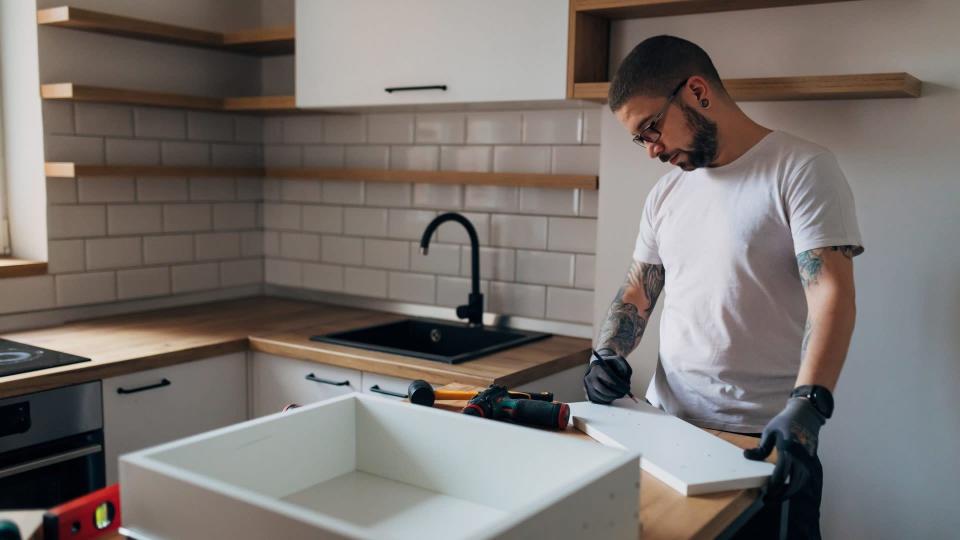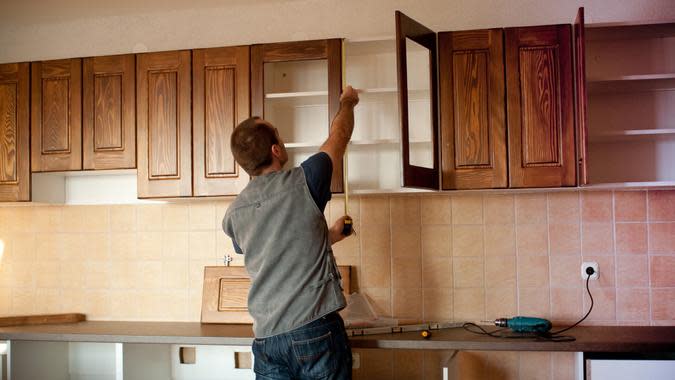[ad_1]

Buying your first home is a major life milestone that also comes along with a whole new set of knowledge you will need to acquire. That’s why it’s important that when it comes to making renovations — whether a minor cosmetic fix or a major overhaul — you do your research before diving in to avoid making a costly blunder.
See Our List: 100 Most Influential Money Experts
Read: 7 Things You Should Never Do When Planning for Retirement
GOBankingRates spoke to real estate experts to find out some of the most common renovation mistakes new homeowners make that can end up costing them big time. Read on so you know what not to do.

Attempting To DIY What Should Be Left to a Professional
There are some renovations you can probably do yourself if you’re handy enough, but don’t attempt to DIY a complex renovation project that you don’t have the skills to do well.
“You can find every single tutorial that you can possibly imagine on YouTube, but this doesn’t mean it’s a project you should take on,” said Nicky Taveras, owner of DNT Home Buyers. “Small and quick updates like building a small shelf or changing the paint are OK and anyone can do it, but please avoid demolishing walls or kitchen sinks. This can cost you a lot of money to do it yourself, let alone all the mistakes you can make that you will need to pay to fix. Doing it yourself can be rewarding and fun, but if you don’t know what you’re doing and what materials to buy, you may find yourself with a hefty bill once everything is done.”
Live Richer Podcast: First-Time Homebuying During Inflation: Is It Worth It?

Making a Renovation With a Bad ROI
If you plan for your first home to be your forever home, you can make any custom renovations you like. But if you plan to sell and upgrade at some point, think twice before making a renovation that will make your home less appealing to prospective buyers.
“Custom passion projects are hard sells once it comes time for potential buyers to move into their new house,” said Greg Toschi, CEO and co-founder of Poplar Homes. “For example, in San Francisco, adding on a sunroom has a negative 88% ROI. In New York City, a sunroom generates a negative 179% return. Not everyone has the same passion, so if you do plan on a custom build renovation, make it something universally loved.”

Always Going for the Lowest Bid
When choosing a pro to make a renovation, going for the lowest bid can actually end up costing you more in some cases.
“We all know you get what you pay for, and choosing a contractor is no different,” said Jason Gelios, a realtor with Community Choice Realty in Southeast Michigan. “A mistake like this could end up costing thousands more, including time wasted. I’ve seen rookie real estate investors make the mistake of only considering price when shopping for contractors. Many times they will bid low to get the business, only to increase the costs as the renovation progresses.”
If a bid seems too good to be true, take the time to read reviews of the contractor on the Better Business Bureau website.
“Spend your time, do your due diligence, find out what other people experienced with this vendor and learn from other people’s mistakes,” said Yawar Charlie, director of the estates division at the Aaron Kirman Group with Compass. “I wish that I had taken the time to look up some of my vendors in a deeper way because I could’ve avoided some of the pitfalls that I faced myself.”

Not Getting an Estimate and Contractor Agreement
Once you have vetted your prospective contractor, it’s important to go over the details relating to the cost and scope of the project — and to get everything in writing.
“A contractor should always provide you with a detailed list of material and labor costs,” said Jeff Shipwash, founder of Shipwash Properties LLC. “This certainly takes time for them to do, but if you have a large renovation project, you need to have this completed. This will protect you in the future.”
Once you receive the detailed estimate, make sure to put it in a contract.
“Complete a generic contractors agreement that states the total cost, estimated time to completion and the responsibilities of each party,” Shipwash said. “Many templates are available online. This will be a great tool if you ever need to seek legal action against a contractor. This agreement will also provide proof and a reference of the expectations that each party can refer back to during and towards the end of the project.”

Opting for the Cheapest Materials
Just like taking the lowest bid is not always the best financial option, cutting costs when choosing materials can also end up costing you in the long run.
“Many of my clients demand to use only the cheapest materials because they want to save on costs,” said Zach Reece, chief operating officer at Colony Roofers as well as a certified public accountant. “This is a mistake because for the more extensive remodels like a complete roof replacement or building a new deck, it’s more cost-effective to spend more on higher-quality materials that require less maintenance and, most importantly, are more durable, than to spend less money on cheaper materials that force you to replace them again in a few years.”

Not Taking a Holistic View
“Many times when you upgrade one portion of a house, other sections that are in close proximity start to look even older and more outdated,” said Donald Olhausen Jr., a house flipper and owner of WeBuyHousesInSanDiego.com. “For example, fresh paint in a kitchen can really make your cabinets and hardware look old and dingy.”
Ideally, you will renovate a whole section of your house at one time instead of picking random projects here and there. If that is out of your budget, wait until you’ve saved enough to do it all in one shot to avoid having a mish-mash of old and new in a single area. If you’re unhappy with the look of your home, you may consider the renovation you made a waste of money.

Prioritizing Aesthetics Over Function
“The biggest renovation mistake is prioritizing form over function,” said Joshua Blackburn, director of design and construction at Evolving Home. “Some oblivious homeowners prioritize the aesthetics of their project rather than its functionality. As a result, it compromises the stability and functionality of the finished project. In this scenario, it is normal for it to break down faster than its expected lifespan.”
Of course you want your renovation project to look nice, but always ensure that it is functional too, or it will need to be redone and cost you all over again.

Not Obtaining the Proper Permits
“There’s one issue we run into frequently, which is homeowners not getting permits for renovation work,” said Kevin Bazazzadeh, owner of Brilliant Day Homes. “Permits are required for most construction work that goes beyond maintenance and small changes, including plumbing and electrical work.”
Getting the proper permits protects both you and any future owners of the home.
“When a permit is pulled, an inspector comes to verify that the work has been done correctly and in strict compliance with the code,” Bazazzadeh said. “In this way, the owner is protected from contractors who don’t know what they are doing or are trying to take advantage of them by cutting corners.”
In addition to protecting you from getting potentially ripped off by contractors, having the proper permits can save you money when it comes time to sell your home.
“We have come across many people trying to sell their houses that had unpermitted work that had to have additions torn down or walls ripped open, and ultimately lost much more money than the permitted work would have cost them,” Bazazzadeh said.

Not Being Aware of Property Lines and Setbacks
Creating or renovating outdoor spaces is a popular project, but it can cost you if you don’t plan it out properly.
“Prior to building that deck, pool or outdoor kitchen, it’s important to know where your property lines are, and what setbacks — the distance from your property line to a structure — are required in your town,” said Patty Matus, a real estate agent with Century 21 Alliance Realty Group in Ulster County, New York. “The last thing you want to do is to build a fabulous deck, only to have to take it down or modify it because of a setback violation.”
Have a professional survey done before making any major renovations to your outdoor space to avoid this costly mistake.
“Don’t rely on mobile apps or sites that provide parcel data, as they can be inaccurate,” Matus said. “In my area, it’s not uncommon for those maps to be off by 10 to 20 feet in any direction.”

Rushing Into Renovations
When you move into a home, you may be eager to start renovating ASAP, but it’s sometimes better to take some time to get a clear picture of how you want to prioritize your renovation budget.
“Everyone has all this initial energy and drive to tackle home renovation projects when they close on a home, but over time, many of people run out of ambition, time and/or money,” said Link Moser, a real estate broker/owner with Experience Homes Group in New Hampshire. “We also find that we learn to live with some of the imperfections. A lot of people rush into tackling projects that end up taking resources away from something else.”

Not Having a ‘Contingency Budget’
Your renovation budget should have wiggle room beyond the estimated cost. This will prevent you from needing to take on debt to account for unexpected expenses that pop up during the renovation process.
“As things get rolling, expenses tend to stack up,” said Peter Evering, business development manager with property management firm Utopia Management. “Opening up walls, for example, can expose you to expenses you did not anticipate, such as mold damage or termites. Always account for unforeseen expenses — this is called a contingency budget.”
More From GOBankingRates
This article originally appeared on GOBankingRates.com: 11 Home Renovation Mistakes New Homeowners Make That Can Cost Them
[ad_2]
Source link
